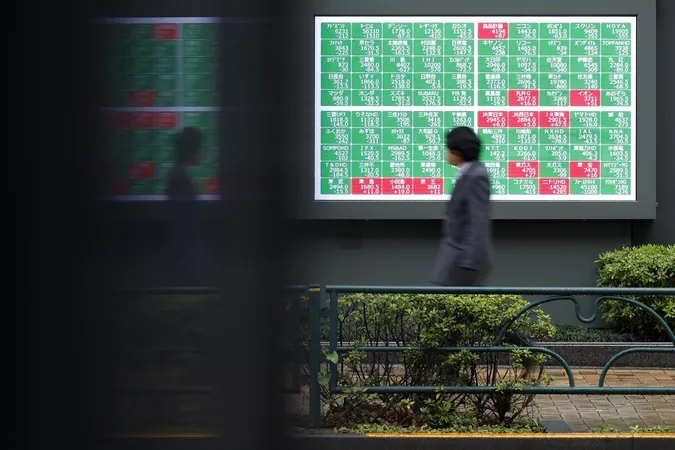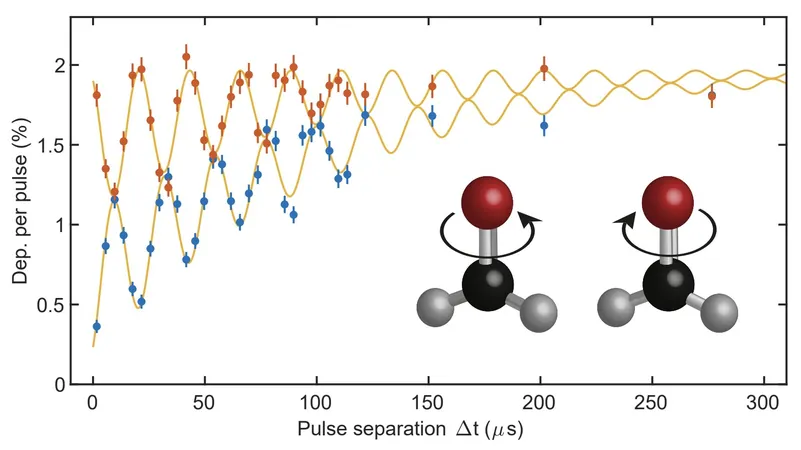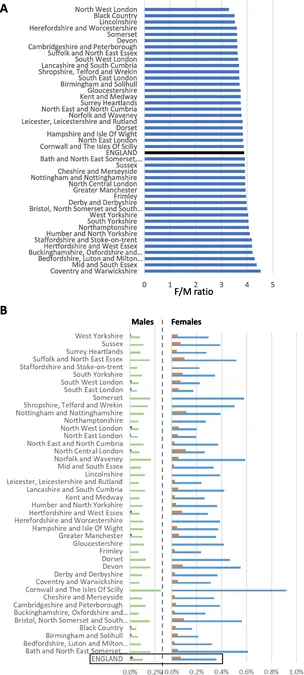
Asia Stocks Plummet as Trump’s Tariff Shock Sparks Global Recession Fears; Singapore’s STI Dives 3%
2025-04-04
Author: Mei
Asia Stocks Plummet as Trump’s Tariff Shock Sparks Global Recession Fears; Singapore’s STI Dives 3%
Asian stock markets took a significant hit on April 4, extending a global decline triggered by US President Donald Trump’s recent tariff announcements, which have ignited fears of an escalating trade war and potential worldwide recession.
In Singapore, the Straits Times Index (STI) fell sharply by nearly 3 percent, losing 116.37 points to end at 3,825.86. Deputy Prime Minister Gan Kim Yong acknowledged on April 3 that the sweeping tariffs could have a substantial impact on Singapore's economy.
Japan's Nikkei 225 index officially entered bear market territory, plummeting 20 percent from its peak last July. On this day, it closed down 2.75 percent, contributing to a staggering 9 percent dip for the week. In Australia, the S&P/ASX 200 fell by 2.4 percent, while South Korea's Kospi index experienced a lesser decline of 0.9 percent. However, markets in China, Hong Kong, and Taiwan were closed on April 4 for holidays.
Meanwhile, European markets mirrored this decline in morning trading, with France’s CAC index retracting 1.8 percent, Germany's DAX dropping 2.2 percent, and Britain’s FTSE index also falling by 1.8 percent. Pre-market US trading indicated larger losses, with Dow Jones Industrial Average futures down 387 points, or 1 percent. The S&P futures slipped by 0.7 percent, and Nasdaq futures were down 0.5 percent.
The day prior, the US stock market faced its worst performance in years after Trump’s latest tariff announcements led to a drastic sell-off, driving investors towards safer assets. The S&P 500 saw a staggering drop of 4.9 percent, while the Nasdaq 100 fell by 5.5 percent. These losses collectively wiped approximately $2.5 trillion off the US stock market valuations.
Investors have grown increasingly concerned that Trump's aggressive tariff strategy will weaken economic growth. US small-cap stocks, generally more sensitive to domestic economic changes, plummeted 6.6 percent, underscoring fears surrounding the impact of the tariffs on growth prospects.
The US dollar itself experienced a harsh decline, reversing gains made since Trump's election in November 2016. This sparked debate about its status as a safe-haven asset, particularly as the Japanese yen and Swiss franc surged in response. The Bloomberg Dollar Spot Index dropped 0.4 percent on April 4, following a 1.5 percent decline the day before.
As volatility gripped the markets, oil prices continued to plummet, extending a decline that saw prices drop over 6 percent overnight. This was fueled by the Organization of the Petroleum Exporting Countries (OPEC) and its allies unexpectedly increasing supply by three times the planned amount.
The implications of these unfolding events paint a grim picture for the US economy. According to experts, if these tariffs remain in place, the economy is likely to face significant slowdowns. Mary Ann Bartels from Sanctuary Wealth states, "If these tariffs stick, the economy is going to slow down," warning that the impact will be felt globally.
The uncertainty surrounding these developments has prompted economists and analysts to revise growth forecasts downward, especially for Asian economies highly reliant on trade. Goldman Sachs has cautioned that the likelihood of a recession in the US has now escalated to 50 percent or more.
Legendary investor Bill Gross has advised caution to investors amidst this turmoil, stating, "Investors should not try to 'catch a falling knife.'" He emphasized the need for vigilance in navigating this historically notable economic moment – one that resembles past economic upheavals with dire consequences ahead.
As market participants brace for the April 4 US jobs report and a crucial speech from Federal Reserve Chairman Jerome Powell, many are left wondering: How much longer can global markets withstand the pressure from rising tariffs and economic instability? The global economic landscape is shifting, and investors are feeling the tremors of change.



 Brasil (PT)
Brasil (PT)
 Canada (EN)
Canada (EN)
 Chile (ES)
Chile (ES)
 Česko (CS)
Česko (CS)
 대한민국 (KO)
대한민국 (KO)
 España (ES)
España (ES)
 France (FR)
France (FR)
 Hong Kong (EN)
Hong Kong (EN)
 Italia (IT)
Italia (IT)
 日本 (JA)
日本 (JA)
 Magyarország (HU)
Magyarország (HU)
 Norge (NO)
Norge (NO)
 Polska (PL)
Polska (PL)
 Schweiz (DE)
Schweiz (DE)
 Singapore (EN)
Singapore (EN)
 Sverige (SV)
Sverige (SV)
 Suomi (FI)
Suomi (FI)
 Türkiye (TR)
Türkiye (TR)
 الإمارات العربية المتحدة (AR)
الإمارات العربية المتحدة (AR)